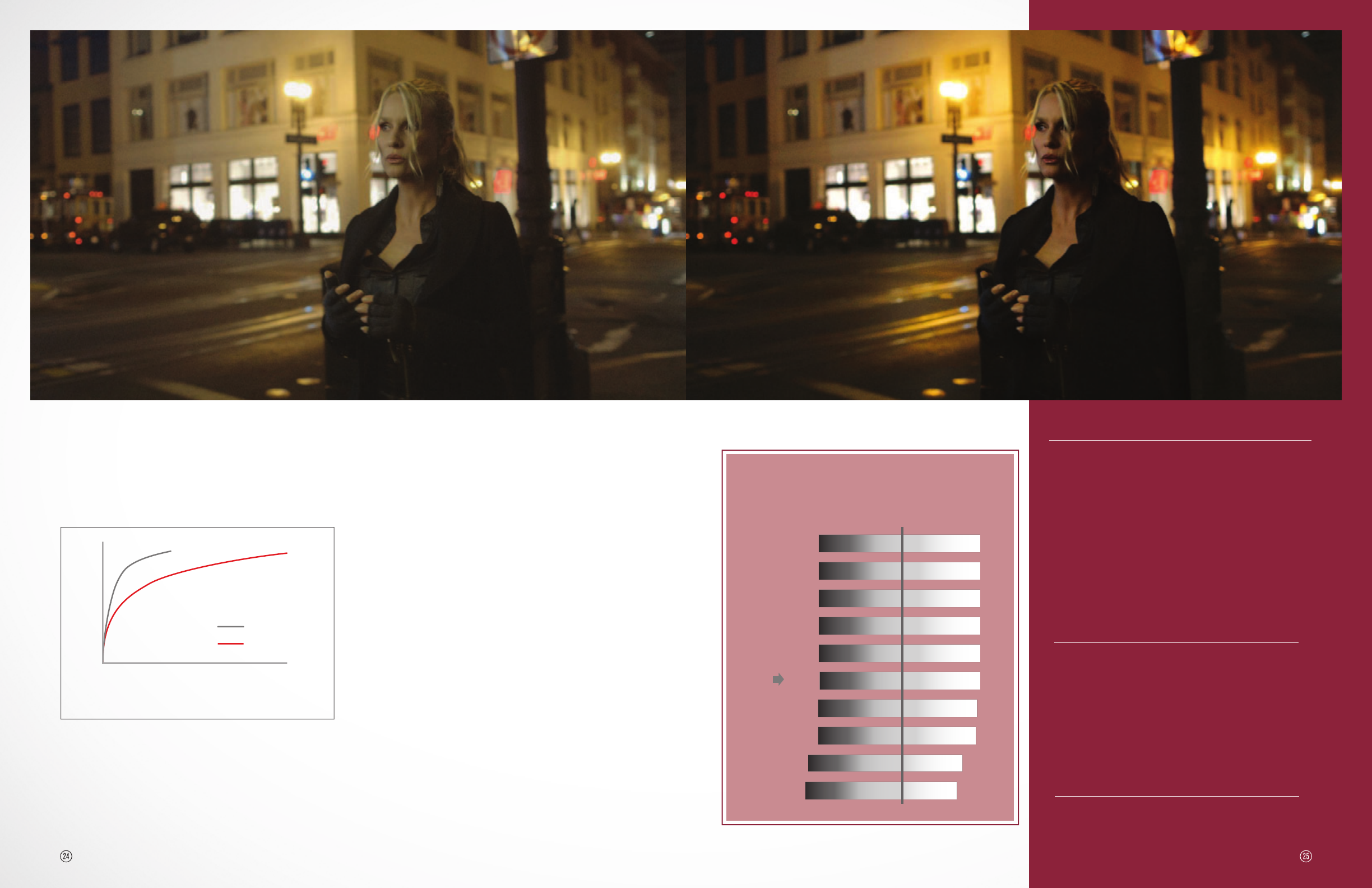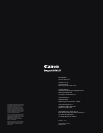
Canon Log Gamma
Shooting in Canon Log mode, cinematographers can set the
camera exposure value using their customary light meter practices.
Canon Log is a special nonlinear transfer function embodied
within the
≥
DV III RGB video processing system. This transfer
function is specifically designed to facilitate the post-production
of digital images originating in Cinema EOS in a manner akin to
the post-production of images digitally transferred from motion
picture film (the contemporary DI process). By managing the
disposition of quantization bits, Canon Log ensures excellent
tonal reproduction within both highlight and lowlight regions of a
given digital image – maintaining a total dynamic range of 800%.
Dynamic Range
Wide Latitude Even in Low Light
The EOS C300 and EOS C300 PL incorporate the first Canon
CMOS sensor designed specifically for high frame rate mo-
tion pictures, offering not only high resolution and shallow
depth-of-field but also high sensitivity with low noise. Working
together, Canon’s Super 35mm sensor and
≥
DV III Image
Processor achieve a remarkably high signal-to-noise ratio that
lets you record with great detail and dynamic range even in
minimal light. A dark and stormy night? With the EOS C300 and
EOS C300 PL, no problem.
These sophisticated video grading processes restructure a new
digital representation that achieves your sought-after creative
look on a quality reference display.
Lens Peripheral Illumination Correction
When shooting with Canon EF optics that support Peripheral
Illumination Correction, the EOS C300 can automatically
compensate for the light fall off or vignetting characteristics of
each particular lens. Correction data specific to each lens model
is loaded onto the camera’s firmware, with future lens data
added through firmware updates.
High Image Quality for Post Production Benefits
Whether showing dailies to producers or beginning the edit
process, professionals demand images of the highest quality –
pictures that look great and hold up during post-production. Canon
developed the EOS C300 and EOS C300 PL sensor to capture
images with a wide pixel pitch for detailed, low-noise blacks and
impressive dynamic latitude even at higher sensitivities. The
EOS C300 and EOS C300 PL can also record different frame rates,
including 23.98, true 24.00 if you’re also shooting with a film
camera, plus 25P/50i and 30P/60i. Capturing high-quality images
ready for post, the EOS C300 and EOS C300 PL benefit everyone
involved in the cinematic process, from capture to post.
Frame grab from the Sam Nicholson, A.S.C., film “XXIT,” shot in Canon Log mode. Frame grab after color grading.
EOS C300 and EOS C300 PL – ISO and Dynamic Range
specifications (Canon Log, Progressive scan)
“ Y o u see things that you never
saw before in the frame while
shooting with the EOS C300. So
suddenly, you’re thinking, ‘Wow,
I’ve never seen the back-kick o
the filter, but then again, I’ve
never shot at 16000 either.’”
SAM NICHOLSON, A.S.C.
Director of “XXIT”
18%
GRAY ISOGAIN
5.3 Stops6.7 Stops
ISO
20000
30dB
5.3
Stops6.7 Stops
ISO
12800
26dB
5.3 Stops6.7 Stops
ISO
3200
14dB
5.3 Stops6.7 Stops
ISO
6400
20dB
5.3 Stops6.7 Stops
ISO
850
2.5dB
5.2 Stops6.8 Stops
ISO
800
2dB
4.9 Stops6.8 Stops
ISO
640
0dB
4.2 Stops7.8 Stops
ISO
400
-4dB
3.9 Stops8.1 Stops
ISO
320
-6dB
Canon Log
Base
Sensitivity
5.3 Stops6.7 Stops
ISO
1600
S/N
Ratio
41dB
45dB
53dB
50dB
54dB
54dB
54dB
54dB
54dB
54dB
8dB
Normal 1
Canon Log
OUTPUT
INPUT
Canon Log – Ensures tonal reproduction for both highlight and
lowlight regions during post-production.
24 25


















